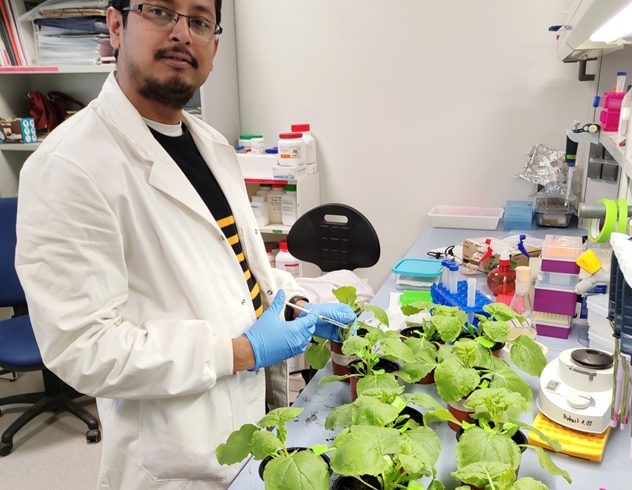Dr. Anurag Kashyap is currently working as Assistant Professor in the Department of Plant Pathology, Assam Agricultural University (AAU), Jorhat, Assam. He obtained his B.Sc. (Agri.) and M.Sc. (Agri.) degrees from Assam Agricultural University and obtained his Ph.D. from Autonomous University of Barcelona, Spain in 2021. In the year 2016, he received the Netaji Subhas – Indian Council of Agricultural Research (ICAR) – International Fellowship for pursuing Ph.D. studies at Centre for Research in Agricultural Genomics, Barcelona, Spain, where he worked on the topic “Ralstonia solanacearum – triggered defence responses at the tomato root xylem vasculature: Insights on the suberin pathway” under the supervision of Dr. Nuria Sanchez Coll. His Doctoral thesis was awarded with the “Excellent cum laude” title by Autonomous University of Barcelona. Besides, he was also awarded with AAU Gold Medal for securing the highest CGPA in B.Sc. (Agri.) degree programme and he also secured the first position in M.Sc. (Agri) programme of AAU. Till date, he has published a number of research and review articles on plant-pathogen interaction in international, peer reviewed, high impact factor journals. His recent first author publication entitled “Induced ligno-suberin vascular coating and tyramine-derived hydroxycinnamic acid amides restrict Ralstonia solanacearum colonization in resistant tomato” featured on the cover page of the journal, New Phytologist (May, 2022; Vol. 234, No. 4).
After joining Assam Agricultural University, Dr. Kashyap started research work on mechanisms governing plant host resistance against pathogens, wherein he is studying the interaction of tomato cultivars against Ralstonia solanacearum using histopathological and multi-OMICs approaches. This project has recently been approved by Science and Engineering Research Board (SERB) for funding, where he will also focus on engineering pathogen and drought tolerance through tissue-specific expression of key secondary cell wall pathway genetic regulators at the targeted sites using tomato as a model plant. Besides, Dr. Kashyap is also exploring various phytochemical constituents of indigenous ethnobotanical plants for their application as biopesticides as an alternative to harmful chemicals that are used in plant disease management. In collaboration with NETES Institute of Pharmaceutical Sciences, Guwahati, a number of important phytochemicals have been identified having efficacy against plant pathogens. To carry forward this research, Dr. Kashyap and his team obtained approval of funding from Department of Science and Technology (DST) to develop next generation phytochemical biopesticide formulations as well as for their technology transfer and commercialization. Another interesting area where his team is working is the exploration of efficient nanocellulose producing bacteria and use of bacterial nanocellulose films for drug delivery, bio-packaging and other industrial applications. Recently, a grant related to bacterial nanocellulose in food packaging applications has been awarded to Dr. Kashyap under the Department of Biotechnology (DBT) funded- Advanced Level State Biotech Hub of Assam.
Salient Research Outputs:
- Identified spatiotemporal phases where resistant tomato cultivars are able to restrict bacterial plant pathogen solanacearum invasion in planta.
- Unearthed a key cell wall remodeling mechanism in xylem vascular tissue of resistant tomato, induced upon invasion of solanacearum.
- Developed genetic and histopathological tools to study pathogen induced suberin formation in resistant tomato.
- Identified an important gene in the lingo-suberin pathway imparting resistance to solanacearum in tomato.
Ralstonia solanacearum is a devastating pathogen across India. Insights obtained on cell wall reinforcement mechanisms undertaken by resistant tomato against the bacterium will be vital in generating plants resistant to the bacterium, by biotechnological approaches. Insights obtained on gene targets and metabolites pathways in R. solanacearum defense will help engineer resistant plants as well as design novel and safe pesticides.
Recent publications:
Kashyap, A.; Jimenez-Jimenez, A.L.; Zhang, W.; Capellades, M.; Srinivasan, S.; Laromaine, A.; Serra, O.; Figueras, M.; Rencoret, J.; Gutiérrez, A.; Valls, M. and Coll, N.S. (2022). Induced ligno-suberin vascular coating and tyramine-derived hydroxycinnamic acid amides restrict Ralstonia solanacearum colonization in resistant tomato. New Phytologist. 234: 1411–1429.
Kashyap, A., Planas-marquès, M., and Valls, M. (2021). Blocking intruders: inducible physico-chemical barriers against plant vascular wilt pathogens. Journal of Experimental Botany. 72: 184–198.
Menna, A.; Dora, S.; Sancho-Andrés, G.; Kashyap, A.; Meena, M.K.; Sklodowski, K.; Gasperini, D.; Coll, N.S. and Sánchez-Rodríguez, C. (2021). A primary cell wall cellulose-dependent defense mechanism against vascular pathogens revealed by time-resolved dual transcriptomics. BMC Biology. 19: 161.
Planas-Marquès, M.; Kressin, J.P.; Kashyap, A.; Panthee, D.R.; Louws, F.J.; Coll, N.S. and Valls, M. (2019). Four bottlenecks restrict colonization and invasion by the pathogen Ralstonia solanacearum in resistant tomato. Journal of Experimental Botany. 71: 2157–2171.
Sebastià, P.; Pedro-jové, R. De; Daubech, B.; Kashyap, A.; Coll, N.S. and Valls, M. (2021). The bacterial wilt reservoir host Solanum dulcamara shows resistance to Ralstonia solanacearum infection. Frontiers in Plant Science. 12: 755708.
Das, A.; Mishra, A.; Kashyap, A.; Naika, M.B.N. and Barah, P. (2022). “KRiShI”: a manually curated knowledgebase on rice sheath blight disease. Functional & Integrative Genomics, https://doi.org/10.1007/s10142-022-00899-9.

Dr. Anurag Kashyap at the campus of Autonmous University of Barcelona (UAB), Bellaterra, Spain. In the background are the UAB columns, which is the iconic monument of the university.

Dr. Anurag Kashyap with the students of Department of Plant Pathology, Assam Agricultural University. (Left to right: Ankita Saha, Ananya Purkayastha, Pragya Permita Acharyya, Dibya sree Dutta and Gowtham Routhu).

Dr. Anurag Kashyap at Centre for Research in Agricultural Genomics (CRAG) which is a consortium formed by the Spanish National Research Council (CSIC), the Institute of Agrifood Research and Technology (IRTA), the Autonomous University of Barcelona (UAB) and the University of Barcelona (UB), and is awarded with “Severo Ochoa Centre of Excellence”.

Dr. Anurag Kashyap performing Agroinoculation for transient expression of proteins in Nicotiana benthamiana.

Dr. Anurag Kashyap (left) with his PhD supervisor Dr. Nuria Sanchez Coll (right) and advisory member Dr. Marc Valls (centre).

Dr. Anurag Kashyap at Centre for Research in Agricultural Genomics (CRAG) with his lab members and Ph.D. advisors.

Dr. Anurag Kashyap while recording observations of the tomato transgenic lines which he developed at Centre for Research in Agricultural Genomics (CRAG)




